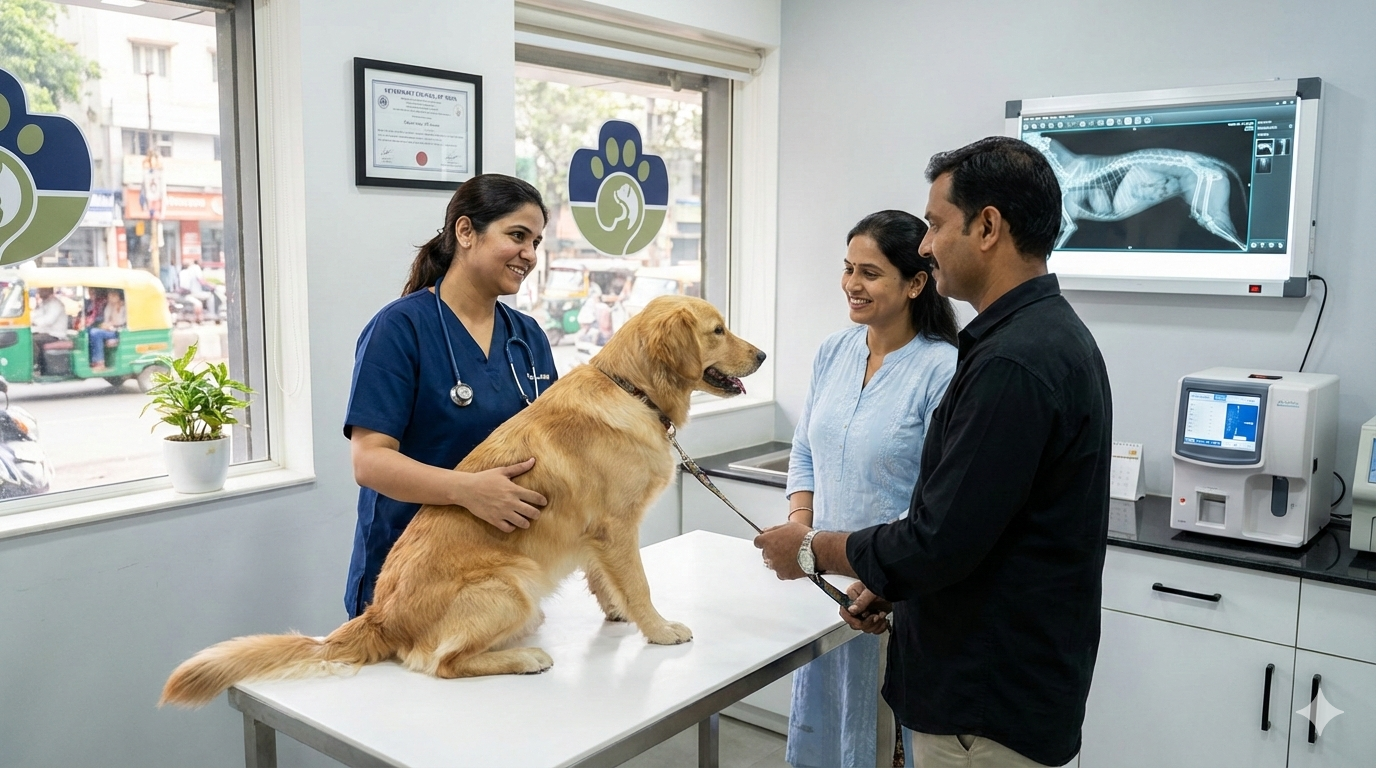Are you a veterinarian dreaming of a new adventure?
The chance to work in a new country, experience a different culture, and take on a fresh professional challenge is very motivating. While the process of moving and getting a license can seem daunting, many countries are actively seeking skilled veterinary professionals.
With a little research and a lot of preparation, your dream career abroad can become a reality.
Here, we explore some of the top countries for veterinary careers and break down the general steps to help you settle in.
Australia

Australia is a top destination for veterinarians, offering a high quality of life, diverse landscapes, and a strong demand for skilled professionals. The country's varied climates mean you could find yourself working with anything from city pets to outback livestock.
- Licensing: Your first step is to get your qualifications assessed by the Australasian Veterinary Boards Council (AVBC). The good news is that many degrees, particularly from countries like the UK, New Zealand, Canada, and the USA, are often recognized directly (AVBC Qualifications Generally Recognised by AVBC). If your degree isn't on the list, you'll need to pass the Australasian Veterinary Examination (AVE).
- Qualifications and Eligibility: For skilled migration visas (such as the Skilled Nominated visa, subclass 190), you generally must be under 45 years of age (VisaEnvoy). While there is no specific GPA requirement for licensing, the AVBC will assess your qualifications and require that they are a completed veterinary qualification. Immigration is a point-based system, so factors like your age, English proficiency, and work experience will earn your points.
- Earning Potential: The average annual salary for a veterinarian in Australia ranges from AUD $110,000 to $130,000 (Seek). For entry-level positions, you can expect to earn around $60,000 to $75,000 per year, while highly experienced or specialized vets can make over $195,000 (Pawssum blog).
- Selection Rate & Competitiveness: The selection process for veterinary school is highly competitive, often involving a combination of academic performance, a personal statement, an aptitude test (like Casper), and an interview (Murdoch University).
- Immigration: Veterinarians are on Australia's Skilled Occupation List, which makes you eligible for various skilled migration visas, such as the Skilled Nominated visa (subclass 190). Having a job offer from an Australian employer can also open doors for sponsored visas. The process is point-based, so factors like your age, English proficiency, and work experience will earn your points.
New Zealand
Much like its neighbor across the Tasman Sea, New Zealand is an incredibly popular choice for international vets. The country is known for its stunning natural beauty and a strong work-life balance. There is a particular demand for vets in rural and mixed-animal practices.
- Licensing: The Veterinary Council of New Zealand (VCNZ) is the licensing body. If you are a graduate of an accredited veterinary school (including many from the UK, Australia, USA, and Canada), you may be able to register without further examination (VCNZ, Registration). Otherwise, you may need to sit the National Veterinary Examination. You will also need to demonstrate a good level of English proficiency.
- Qualifications and Eligibility: The VCNZ's main requirement is a completed, recognized veterinary degree (Brontë Group). There is no publicly stated GPA requirement for the licensing process itself. While age is not a strict barrier, the Skilled Migrant Category Resident Visa is a points-based system that favors younger applicants.
- Earning Potential: The average annual salary for a veterinarian in New Zealand ranges from NZD $100,000 to $120,000 (Seek). Entry-level vets can expect to start around $60,000, while experienced vets can earn up to $120,000 per year (GVC Vets).
- Selection Rate & Competitiveness: Entry into New Zealand's sole veterinary school at Massey University is highly competitive. There are typically 3-4 times more domestic applicants than there are places available in the professional phase of the program (Massey University).
- Immigration: Veterinarians are a high-priority occupation for New Zealand immigration. The country offers a range of visa options for skilled workers, and having a job offer is a significant advantage. The process is streamlined, reflecting the high demand for your skills.
Canada

Canada provides a diverse professional landscape, from bustling city clinics to remote, picturesque communities. The country's strong economy and high demand for vets, particularly in certain provinces, make it an attractive choice.
- Licensing: To practice in Canada, most foreign-trained vets need to complete the National Examination Board (NEB) accreditation process and pass the North American Veterinary Licensing Exam (NAVLE) (ICVA). You'll also need to register with the specific provincial regulatory body where you plan to work, which may have additional requirements.
- Qualifications and Eligibility: While there is no specific GPA requirement for licensing foreign-trained vets, it's worth noting that Canadian universities often require a minimum undergraduate GPA of around 3.2 on a 4.0 scale for admission to their Doctor of Veterinary Medicine programs (University of Guelph). The focus for international veterinarians is on passing the required examinations and securing the Certificate of Qualification. Canada's Express Entry immigration system awards points for age, with the highest points for those between 20 and 29.
- Earning Potential: The average veterinarian in Canada earns approximately CAD $105,141 per year. Entry-level salaries start around $86,000, while experienced workers can make up to $146,000 annually (Talent.com).
- Selection Rate & Competitiveness: Veterinary school admission in Canada is extremely competitive. According to one source, for every student accepted into a Canadian DVM program, there may be as many as 700 to 1,000 applicants who are not (ILAC).
- Immigration: Canada's Express Entry system is a popular pathway for skilled workers seeking permanent residency. As a veterinarian, you are often eligible for this program. You can also explore Provincial Nominee Programs (PNPs), which allow individual provinces to nominate skilled immigrants based on their specific labor needs.
The United Kingdom
The UK offers a rich history, a strong veterinary profession, and a wide range of opportunities in both urban and rural settings. It is also an excellent base for exploring the rest of Europe.
- Licensing: All vets practicing in the UK must be registered with the Royal College of Veterinary Surgeons (RCVS). If you have a veterinary qualification from an approved institution (including those in Australia, New Zealand, Canada, and the USA), you can apply for registration without sitting an exam (RCVS). For other qualifications, you will need to go through an alternative registration process, which may involve examinations.
- Qualifications and Eligibility: The RCVS does not have a public GPA requirement for registration. The main criteria are that your veterinary qualification is from an approved institution or that you pass the required examinations. The UK's Skilled Worker visa program does not have an age cap, but it is typically linked to a job offer and a Certificate of Sponsorship from an employer (UK Government).
- Earning Potential: Starting salaries for newly qualified vets are generally around £32,000 to £33,600. With further training and experience, your salary can rise to between £40,000 and £70,000, with highly experienced vets earning £70,000 to £100,000 (Prospects.ac.uk).
- Selection Rate & Competitiveness: While competitive, the acceptance rate for veterinary school in the UK is around 50% for those applying in their first year. The opening of new vet schools has increased the number of places available, making it more accessible (jrhaley.com).

Getting Started: Your Action Plan
Regardless of the country you choose, the general process of moving is often the same. Here's a quick checklist to get you started:
- Research Licensing: Check the official veterinary council or board website for the country you're interested in. This is the most critical first step.
- Assess Your Qualifications: Find out if your university is accredited or if you'll need to sit for a national examination.
- Explore Visa Options: Visit the official government immigration websites for your chosen country to understand the visa requirements and application process.
- Polish Your CV: Tailor your resume or CV to highlight your skills and experience and consider getting it professionally edited.
- Network: Reach out to veterinary professionals or recruitment agencies in the country to get a feel for the job market and make connections.
Making a big move is a significant undertaking, but with the right preparation, you can land your dream job in a fantastic new country.
References
- Australia & New Zealand: Australasian Veterinary Boards Council (AVBC) and VisaEnvoy.
- Australia: Seek and Pawssum blog.
- New Zealand: Veterinary Council of New Zealand (VCNZ), Brontë Group, and Massey University.
- Canada: University of Guelph, International Council for Veterinary Assessment (ICVA), College of Veterinarians of BC, Talent.com, and ILAC.
- United Kingdom: Royal College of Veterinary Surgeons (RCVS), UK Government, Prospects.ac.uk, Whatuni, and jrhaley.com.







